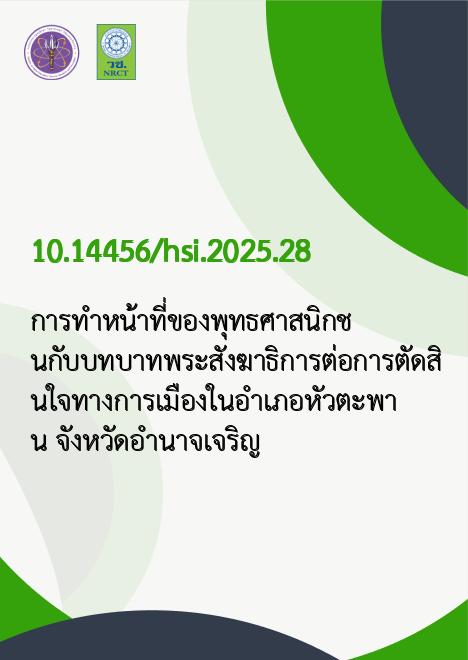
|
การทำหน้าที่ของพุทธศาสนิกชนกับบทบาทพระสังฆาธิการต่อการตัดสินใจทางการเมืองในอำเภอหัวตะพาน จังหวัดอำนาจเจริญ |
|---|---|
| รหัสดีโอไอ | |
| Creator | อภิชาติ เย็นใจ |
| Title | การทำหน้าที่ของพุทธศาสนิกชนกับบทบาทพระสังฆาธิการต่อการตัดสินใจทางการเมืองในอำเภอหัวตะพาน จังหวัดอำนาจเจริญ |
| Contributor | อลงกรณ์ อรรคแสง |
| Publisher | สถาบันวิจัยและพัฒนา มหาวิทยาลัยกาฬสินธุ์ |
| Publication Year | 2568 |
| Journal Title | วารสารมนุษยศาสตร์ สังคมศาสตร์ และนวัตกรรม มหาวิทยาลัยกาฬสินธุ์ |
| Journal Vol. | 4 |
| Journal No. | 2 |
| Page no. | 116-128 |
| Keyword | อำเภอหัวตะพาน, จังหวัดอำนานาจเจริญ, การทำหน้าที่พุทธศาสนิกชน, บทบาทพระสังฆาธิการ, การตัดสินใจทางการเมือง |
| URL Website | https://so02.tci-thaijo.org/index.php/hsi_01/article/view/279867 |
| Website title | วารสารมนุษยศาสตร์ สังคมศาสตร์ และนวัตกรรม มหาวิทยาลัยกาฬสินธุ์ |
| ISSN | ISSN 2821-9635 (Online) |
| Abstract | This study employed a mixed methods research approach, incorporating both quantitative and qualitative methodologies. The quantitative component involved a sample of 400 regular temple-goers in Hua Taphan District, while the qualitative component engaged 15 key informants, including senior Buddhist monks. The quantitative findings revealed that the majority of Buddhist adherents regularly participated in religious activities such as visiting temples, making merit, offering alms, and listening to sermons. These behaviors reflect a deep-rooted religious attachment in daily life, particularly among the elderly and low-income groups. Moreover, participants expressed a “moderate to high” level of agreement (mean score of 2.75) regarding the role of senior monks in providing moral and ethical guidance in the context of elections. The general consensus emphasized that monks should encourage ethical decision-making rather than directly supporting political parties or candidates. The qualitative findings supported these results, indicating that senior monks serve as respected spiritual leaders capable of fostering moral awareness during the electoral process and promoting community unity. However, the majority of respondents opposed monks taking an explicit political stance or openly endorsing political entities. In conclusion, Buddhism and the monastic community continue to exert moral and cultural influence on the political decision-making of the public. Although monks may not play a direct political role, they hold potential as social mechanisms that support ethical decision-making and contribute to a peaceful and sustainable society. |